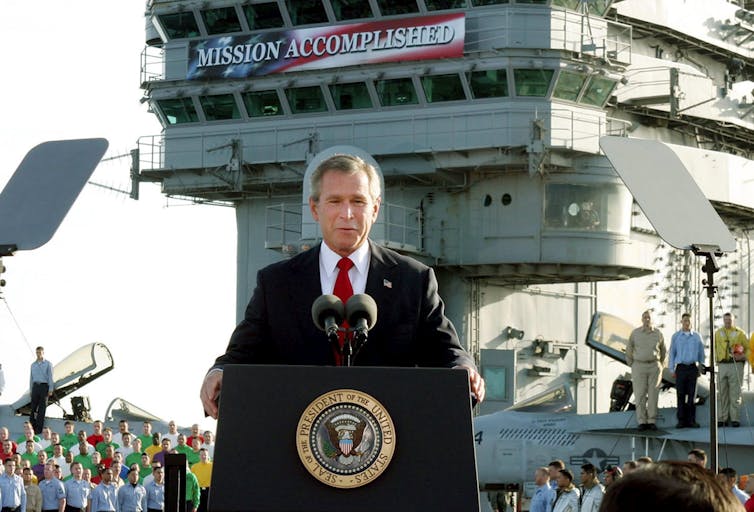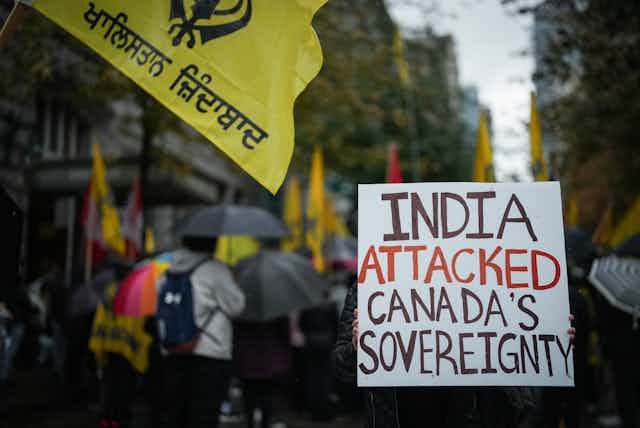Prime Minister Justin Trudeau has accused India of being involved in the assassination of Hardeep Singh Nijjar, a Canadian Sikh leader, on Canadian soil.
Narendra Modi’s right-wing Hindu nationalist Indian government is defiant and denies involvement. Indian officials have instead admonished Canada for being a “safe haven” for Sikh “terrorism,” a pejorative for Sikh self-determination.
India’s weaponization of “terrorism” is a ploy to justify its transnational aggression. It is using the rhetoric of “terrorism” seemingly to imply that if the West can engage in extrajudicial killings, India can too.
The tactic also deflects attention from the Modi government’s well-documented abuses of religious minorities, caste-oppressed and Indigenous people, journalists, activists and academics in India.
Deploying “terrorism” as such mirrors a long history of its use by colonial powers to suppress political dissent.
Terrorism: A contested concept
While the use of “terrorism” is ubiquitous, it has no agreed-upon definition. The Criminal Code of Canada defines terrorism as an act committed “in whole or in part for a political, religious or ideological purpose, objective or cause” with “the intention of intimidating the public.”
“Terrorism” also signifies illegitimate or immoral violence, which legal definitions do not capture.
The so-called War on Terror, initiated after the 9/11 attacks in 2001, gave new life to anti-terrorism legislation globally. This is when Canada incorporated the above definition of “terrorism” into the Criminal Code.
As security agencies focused on “terrorism” by Muslim-identified groups, anti-terrorism laws disproportionately targeted Muslims.
Canadian critical race scholar Sherene Razack argues that counter-terrorism uses “race-thinking” to maintain narrow notions of nationhood. This results in marginalizing certain groups that can then be legitimately subject to repressive and unconstitutional laws.
Terrorism and state violence
The term “terrorism” is intertwined with a colonial history of state violence. The British empire routinely invoked “terrorism” to suppress political dissent within colonies.
In the name of national security, “terrorism” was used in Canada to justify state violence against Indigenous people as well as against feminists, labour movements and other political dissidents.
The War on Terror resulted in the American-led invasion of Iraq and Afghanistan, causing death and displacement of millions, as well as the securitization of Muslim citizens.

State violence could once itself be considered terrorism, but in recent decades, the term has come to exclude state violence.
Terrorism is now understood as illegitimate violence by non-state entities. This is odd considering states themselves can engage in immoral violence on a scale that cannot be matched by non-state organizations.
State violence is often ideologically motivated, with the intention to induce widespread fear and behavioural change. This has prompted some scholars to make the case for reconsidering state violence itself as terrorism.
Colonial techniques of power
The Indian government’s use of the term “terrorism” to squash political dissent borrows from the playbook of colonial powers.
India’s national security laws — the Prevention of Terrorism Act (POTA) and the Unlawful Activities Prevention Act (UAPA) — set the stage for widespread human rights and civil liberties violations.
The Modi government’s 2019 amendment to the UAPA made it possible to designate citizens as terrorists without following formal judicial processes.
These laws have been abused to imprison activists, journalists, human rights defenders, caste-oppressed communities and religious minorities. Claiming terrorism has provided justification to suppress self-determination in Kashmir, the most militarized zone in the world.
Concerns for national security have also dominated new policies in India, like the Citizenship Amendment Act and National Registry of Citizens, that aim to create a monolithic Hindu supremacist state.

Avoiding condemnation
By designating Sikh separatists or Khalistanis as “terrorists,” India has escaped widespread domestic condemnation for its alleged involvement in Nijjar’s murder.
In India, in fact, the term “Khalistani” is often seen as synonymous with terrorism. It functions as a stigmatizing label to justify lethal violence against Sikh separatists.
In the past, Modi’s Hindu nationalist government has dismissed any form of Sikh dissent by categorizing it as Khalistani. In 2020 and 2021, when thousands of Sikh farmers protested new farming laws, the government attempted to discredit the movement by saying that it had been infiltrated by Khalistanis.
Read more: Why Indian farmers are so angry about the Modi government's agricultural reforms
Nijjar’s death could indicate India’s willingness to use state violence against Sikh separatists outside India. In the 1980s, in face of a state-sanctioned pogrom, many Sikhs fled India seeking asylum in Canada and elsewhere.
Today, India targets Sikh political dissidents around the world by labelling them “Khalistani terrorists.” There is widespread speculation India has been violently attacking Sikh activists around the world in violation of international law.
International policing agencies are resisting Indian pressure and refusing extradition requests against Sikh political dissidents.
Meanwhile, evidence is mounting that suggests India was involved in Nijjar’s assassination.
If it turns out India was in fact involved, Nijjar’s death should be regarded not only as an extrajudicial killing but also as an act of state terror — an ideologically driven attempt to quash the Sikh separatist movement by instilling fear among Sikh communities around the world.

With the War on Terror, the U.S. and its allies set the stage for countries to justify state violence under the guise of combating terrorism.
It should come as no surprise that India is emulating the West.
Under the leadership of a right-wing Hindu nationalist government, India is providing similar justifications for events like the murder of Nijjar.

